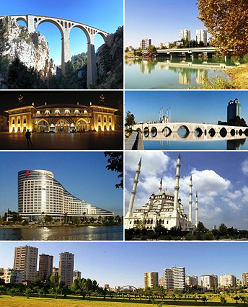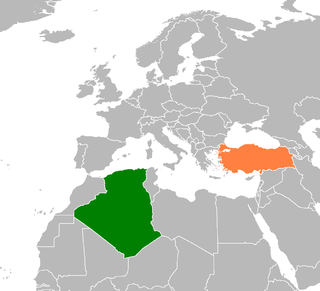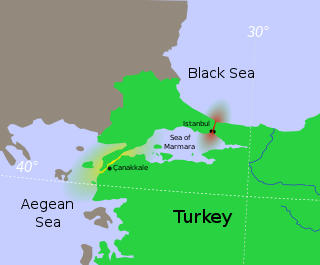Related Research Articles
The foreign relations of Albania are its relations with other governments and peoples. Foreign relations are conducted through the Ministry of Foreign Affairs in Tirana. The current minister is Igli Hasani. The current ambassador to the United Nations is Ferit Hoxha.

Adana Province is a province and metropolitan municipality of Turkey located in central Cilicia. The administrative seat of the province is the city of Adana, home to 78.25% of the residents of the province. Its area is 13,844 km2, and its population is 2,274,106 (2022). It is also closely associated with other Cilician provinces of Mersin, Osmaniye, and (northern) Hatay.

The prime minister of Turkey, officially the prime minister of the Republic of Turkey, was the head of government of the Republic of Turkey from 1920 to 2018, who led a political coalition in the Turkish Parliament and presided over the cabinet. Throughout the political history of Turkey, functions and powers of the post have changed occasionally. Prior to its dissolution as a result of the 2017 Constitutional Referendum, the holder of the premiership was generally the dominant figure in Turkish politics, outweighing the president.

The Turkish Land Forces, or Turkish Army, is the main branch of the Turkish Armed Forces responsible for land-based military operations. The army was formed on November 8, 1920, after the collapse of the Ottoman Empire. Significant campaigns since the foundation of the army include suppression of rebellions in Southeast Anatolia and East Anatolia from the 1920s to the present day, combat in the Korean War, the 1974 Turkish invasion of Cyprus and the current Turkish involvement in the Syrian Civil War, as well as its NATO alliance against the USSR during the Cold War. The army holds the preeminent place within the armed forces. It is customary for the Chief of the General Staff of the Turkish Armed Forces to have been the Commander of the Turkish Land Forces prior to his appointment as Turkey's senior ranking officer.

The Ministry of Justice is the government department responsible for administering the justice system in Turkey; currently administered by Yılmaz Tunç upon the President's appointment.

The Ministry of Foreign Affairs is the governmental body responsible for conducting foreign relations of the Republic of Turkey. The Ministry is responsible for Turkey's diplomatic missions abroad as well as providing support for Turkish citizens and promoting Turkish culture. The ministry implements Turkish foreign policy in accordance with the country's national interests. Established on 2 May 1920, its primary duties are administering diplomatic missions, negotiating international treaties and agreements, and representing the Republic of Turkey at the United Nations. The ministry is headquartered in the Turkish capital of Ankara and counts on more than 200 missions as embassies, permanent representation offices and consulates general, abroad. As of 2021, the Ministry of Foreign Affairs maintains 235 diplomatic posts worldwide. The current Minister of Foreign Affairs is Hakan Fidan, who has held the position since 3 June 2023.

Algerian-Turkish relations refers to the diplomatic relations between Turkey and Algeria. Algeria has an embassy in Ankara, and a general consulate in Istanbul. Turkey has an embassy in Algiers. Both countries are full members of the Union for the Mediterranean.

Ethiopian–Turkish relations are foreign relations between Ethiopia and Turkey. Ethiopia has an embassy in Ankara and Turkey has an embassy in Addis Ababa. Turkey and Ethiopia have great relations, but Turkey has been more supportive of Somalia in the conflict.

The Embassy of Turkey in Washington, D.C. is the diplomatic mission of the Republic of Turkey to the United States. It is located at 2525 Massachusetts Avenue, Northwest in the Embassy Row neighborhood.

Mersin Halkevi is a building in Mersin, Turkey originally built within the scope of the project Halkevleri, but currently used as a cultural center and opera house.

Somalia–Turkey relations are bilateral relations between Somalia and Turkey. The two nations are longstanding partners, engaging in close development cooperation.

The Turkish Straits crisis was a Cold War-era territorial conflict between the Soviet Union and Turkey. Turkey had remained officially neutral throughout most of the Second World War. After the war ended, Turkey was pressured by the Soviet government to institute joint military control of passage through Turkish Straits, which connected the Black Sea to the Mediterranean. When the Turkish government refused, tensions in the region rose, leading to a Soviet show of force and demands for territorial concessions along the Georgia–Turkey border.

Nurettin Canikli is a Turkish politician, the former Minister of National Defense of Turkey and a Member of Parliament for Giresun under the ruling Justice and Development Party. He previously also served as the Deputy Prime Minister of Turkey and the Minister of Customs and Trade of Turkey.
Events in the year 1957 in Turkey.
Ministry of Construction and Settlement was a government ministry office in Turkey.
Ministry of Customs and Monopolies was a former government ministry of Turkey between 1931 and 1983.

The National Front for Liberation is a Syrian rebel coalition that is part of the Syrian National Army (SNA) fighting in the Syrian Civil War. The group was formed by 11 rebel factions in northwestern Syria in May 2018, and was officially announced on 28 May 2018. The formation receives major support from Turkey. The group joined the SNA on 4 October 2019.
Fadlallah al-Haji is a Syrian rebel leader, close to Turkey and the Muslim Brotherhood. Considered a "scrupulous military man" by other Syrian rebel leaders and a "Turkish protégé", al-Haji has led the Sham Legion since its formation in 2014. He was appointed chief of staff of the Syrian Interim Government's General Staff of its Ministry of Defence in 2017, and has been the commander-in-chief of the National Front for Liberation since its formation in 2018. The NFL merged with the Syrian National Army in October 2019, and al-Haji was appointed a deputy chief of staff of the SNA, continuing to preside over the NFL, which will restructure into four legions.
The COVID-19 pandemic in Turkey is part of the ongoing pandemic of coronavirus disease 2019 caused by severe acute respiratory syndrome coronavirus 2.

Iceland–Turkey relations are the bilateral relations between Iceland and Turkey. The diplomatic relations were established in 1957. The Icelandic Embassy in Copenhagen is accredited to Turkey, whereas the Turkish Embassy in Oslo is accredited to Iceland.